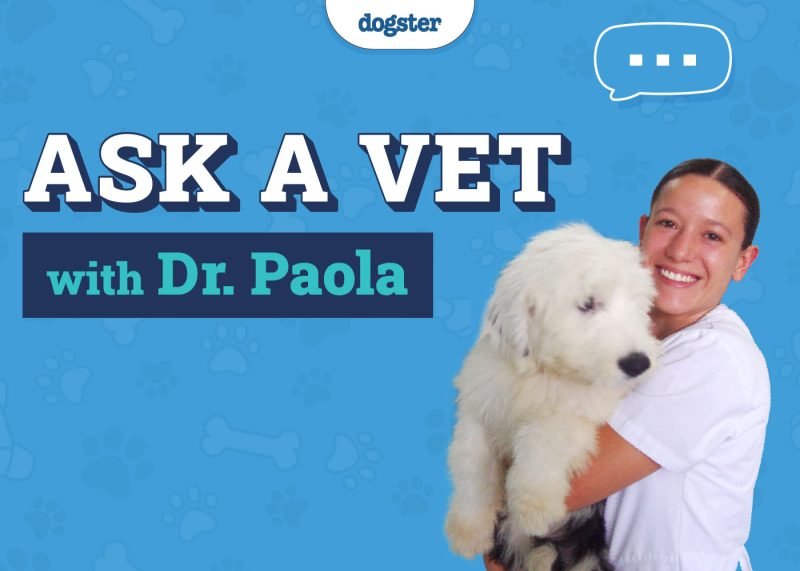

The post Ask Dr. Paola- Tumors, Raisins & Trigger Words (June 23, 2025) by Dr. Paola Cuevas MVZ (Vet) appeared first on Dogster. Copying over entire articles infringes on copyright laws. You may not be aware of it, but all of these articles were assigned, contracted and paid for, so they aren’t considered public domain. However, we appreciate that you like the article and would love it if you continued sharing just the first paragraph of an article, then linking out to the rest of the piece on Dogster.com.
Welcome to our “Ask Dr. Paola” series, where every Monday we bring expert advice straight from Dr. Paola Cuevas (MVZ) to help our readers better understand their dog’s health and well-being.
Whether you’re a new pet parent or a seasoned dog lover, Dr. Paola is here to provide answers to your most pressing questions. From nutrition tips and preventive care to troubleshooting common behavioral issues, Dr. Paola is ready to offer insights that will keep your furry friend happy and healthy. Stay tuned for expert guidance on a range of topics that matter most to you and your dog, so you can make informed decisions and provide the best possible care for your canine companion. Have a question? Send it in here!

Help! My Dog Has Plasma Cell Tumors!
“Dear Dr. Paola,
Darby has been diagnosed with benign plasma cell tumors. For over a year now, each time we located one or more, our veterinarian has removed them and had them tested. She now has 5 more that have grown, and our vet no longer wants to risk surgery at her age. She will be 14 in July 2025.
The vet has been consulting with a specialist at Colorado, and they suggest we start Darby on prednisolone and melphalan instead of surgery. Other than these tumors, Darby seems healthy. She eats well, is interested in her surroundings, has healthy stools, and plays with us. We’re worried that steroids and chemotherapy will harm her and decrease her quality of life.
My daughter read an article that stated plasma cell tumors responded to CBD oil. Are you familiar with using CBD oil this way? Please share how you would treat these types of tumors. Thank you” – Vivian
Hello Vivian,
Thank you for sharing Darby’s story. It’s clear she’s deeply loved and well cared for, and I’m glad to hear that despite the plasma cell tumors, she’s still engaged, eating well, and enjoying life. At nearly 14, her comfort and well-being understandably take priority. The approach your veterinarian and the consulting specialist are recommending is a recognized palliative protocol in cases where surgical removal is no longer the safest option. Prednisolone can help reduce inflammation and may slow tumor progression, while melphalan, though a mild oral chemotherapy drug, can systemically target abnormal plasma cells. When used at the appropriate dose and with careful monitoring (prepare yourself for regular vet visits and bloodwork), this combination is often well tolerated in dogs and may offer you more good-quality time together. The key lies in balancing effectiveness with side effect management, and many dogs continue to enjoy their usual routines while on these medications.
Like you, many pet owners are interested in the potential benefits of CBD oil for pets with cancer. However, at this time, there is no strong scientific evidence confirming its effectiveness against plasma cell tumors specifically. Most of the available data is anecdotal or comes from early-stage studies in lab settings. Some pet parents have reported that CBD helps with pain relief or anxiety, which can indirectly support quality of life, but it is not considered a reliable stand-alone treatment for cancer.
Additionally, while CBD is not the same as THC, it’s important to be aware that its legal status varies. In some countries or states, possession or use may still be restricted, especially when administering it to animals. If you’re considering it, make sure you check your local regulations and always consult your veterinarian to avoid any unintended interactions with her prescribed medications. In these cases, a carefully guided palliative approach, supported by regular monitoring and adjustments, often gives the most compassionate and effective results.
Ultimately, every treatment plan should be guided by how the dog is feeling and what will give them the best quality of life.
– Dr. Paola
If you want real time answers to your questions, you can talk to one of our veterinarians online. Click on the image or button below:


Help! Can Dogs Eat Raisins?
“Can dogs eat raisins?” – Sally, mom of Mona and Mabel
Hi Sally,
It’s lovely to hear from a caring dog mom like you. Mona and Mabel are lucky to have someone looking out for their health, especially when it comes to food safety. Raisins, unfortunately, are not safe for dogs. Even in very small amounts, they can cause sudden kidney failure in some cases. The tricky thing about raisins is that the amount of tartaric acid they contain can vary significantly, leading to unpredictable effects.
Not all dogs react the same way. One might eat a handful and appear completely fine, while another could become seriously ill after just one or two raisins. Although tartaric acid is currently the leading suspect, veterinary medicine has not yet definitively confirmed it as the exact toxin. This uncertainty only adds to the concern. Since there’s no known safe amount, it’s best to treat grapes and raisins like toxic substances and keep them well out of reach. If Mona or Mabel ever happen to eat any, even if they seem fine, it’s important to contact your veterinarian right away.
The kidneys are responsible for filtering waste from the blood, and when they begin to fail, toxins quickly build up in the body. In cases of grape or raisin ingestion, signs of kidney distress such as vomiting, loss of appetite, or lethargy can appear within a few hours. If left untreated, a dog can progress rapidly to complete kidney shutdown. Because of the unpredictable nature of this toxicity, the recommendation is that any amount of grape or raisin ingestion should be treated as an emergency. Quick action in these cases can make all the difference in protecting your dogs because early intervention with decontamination and supportive fluids can prevent serious kidney damage.
Keep up the proactive care
– Dr. Paola

Help! My Dog Gets Too Excited When He Hears the Word ‘Walk’!
“Dear Dr. Paola,
My dog Tilly does a full-body wiggle dance the second I say the word ‘walk.’ We know that he loves walks, but he does this even if we say the word right after we’ve gotten home from a walk! Is there anything we should do?” – Sarah
Hi Sarah,
It sounds like Tilly’s wiggle dance is his version of a happy dance, and it’s a lovely sign of how much he enjoys that special time with you. Dogs are very quick to form emotional associations, and the word “walk” has clearly become a trigger for excitement, much like how some dogs react to the sound of a treat bag or the jingling of keys. Even if he’s just been out, the word itself still sparks that anticipation because it’s tied to a positive experience rather than a physical need.
If you’d like to manage his excitement or avoid over-stimulating him, you can introduce a more neutral or less emotionally loaded cue. For example, instead of saying “walk,” you could start grabbing the leash silently or use a word that sounds nothing like your usual commands, such as “pineapple” or “boots.” You could even try a word in a different language such as“¡Vámonos!” (Spanish for “let’s go”) or the French version, “Allons!” Since it is unlikely you will use these words in other contexts, this is an easy way to help him distinguish real walk times from casual conversation.
Remember that dogs tend to respond better to changes in routine when they’re introduced gradually, so you will need to pair this new cue with the actual walk until Tilly understands the connection. This way, you’re preserving the joy while also helping him stay calm and focused.
By the way, since he is presenting this cute wiggle to you, if you introduce a random cue to it such as “wiggle” and give him a treat, you can very likely capture this behavior. Then he can learn to perform it under stimulus control, meaning whenever you ask him to. This is an alternative way to stop him from doing the wiggle in response to the word “walk.” However, you don’t want to tease him if he is not actually going out.
Happy training! Dr. Paola
- View past week’s questions here: June 16, 2025
- See our full list of past articles here
- Click here to submit a question
The post Ask Dr. Paola- Tumors, Raisins & Trigger Words (June 23, 2025) by Dr. Paola Cuevas MVZ (Vet) appeared first on Dogster. Copying over entire articles infringes on copyright laws. You may not be aware of it, but all of these articles were assigned, contracted and paid for, so they aren’t considered public domain. However, we appreciate that you like the article and would love it if you continued sharing just the first paragraph of an article, then linking out to the rest of the piece on Dogster.com.






